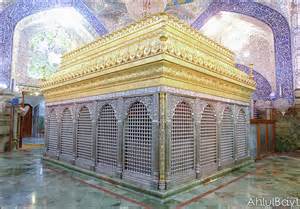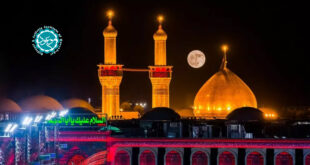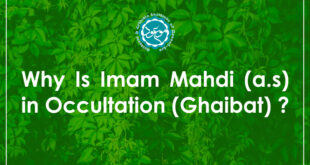The Imāms (‘a) are like other human servants of God and are obligated to perform religious duties. Also, according to the leadership they have been given by God, which they must carry out by the normal laws governing humanity, they must perform their utmost in revitalizing truth and upholding the religion.
The movement of Sayyid al-Shuhadā’ (AS) and its objective
With a short study of the general conditions of that time, the reasons behind Sayyid al-Shuhadā’s (‘a) decisions and measures become clear. The darkest period in the history of Islam for the family of the Prophet (S) and their Shī‘ahs was the twenty years of Mu‘āwīyah’s reign.
After Mu‘āwiyah took over the Islamic caliphate through trickery and became the unconditional monarch of the vast Islamic country, he used all his great power to consolidate his rule and destroy the Ahl al-Bayt of the Prophet (S). Not only did he strive to destroy them, he wanted to completely eradicate them from the minds and tongues of the people.
He made a group of the Prophet’s (S) sahābah who were respected and trusted by the people his followers and used them to fabricate hadīths advantageous to the sahābah and harmful to the Ahl al-Bayt. Also, at his order preachers cursed Amīr al-Mu’minīn (‘a)—as a ‘religious duty’—upon pulpits throughout the Islamic nation.
With agents such as Ziyad ibn Abiyah, Samrah ibn Jundab, and Busr ibn Artāh he killed the friends of the Ahl al-Bayt wherever he found them. In order to do this, he used gold, coercion, bribes, persuasion, and intimidation to the utmost extent possible.
Naturally, persistence of this environment would cause the masses to begin to hate the name of ‘Alī and his family and those who had any love of the Ahl al-Bayt in their hearts to sever all their ties to them in fear of their lives, property, and family security.
The truth of this can be understood by reviewing the Imamate of Sayyid al-Shuhadā’ (‘a) that lasted around ten years which—except the final few months—was contemporary with Mu‘āwiyah. In this entire period, even one jurisprudential hadīth was not cited from him, although he was the Imām of the Time and clarifier of religious teachings and decrees.
(By hadīth I mean a narration that the people cited from him, showing that the people consulted him, not a narration cited from within his family such as by the next Imām.) This shows that in those days, the doors to the house of the Ahl al-Bayt were closed and the people’s referrals to and consultations with Sayyid al-Shuhadā’ (‘a) had reached zero.
The escalating pressure that had beset the Islamic society prevented Imām al-Hasan (‘a) from continuing his fight or revolt against Mu‘āwiyah because, firstly, Mu‘āwiyah had gotten the fealty of the people and in light of this fealty, no one would follow the Imām. Secondly, Mu‘āwiyah had made himself known as one of the great sahābah of the Prophet (S), a Qur’anic scribe, and confidant and right-hand man of three of the first four caliphs.
He had even given himself the title of “Khāl al-Mu’minīn”(literally, Uncle of the Faithful) as a holy appellation. Thirdly, through his singular intrigue, he easily provoked the killing of Imām al-Hasan (‘a) by his own relatives then rose in vengeance to kill the Imām’s murderers. Then, he was able to hold mourning gatherings for the Imām and grieve for him!
Mu‘āwiyah had made living conditions for Imām al-Hasan (‘a) so bad that the Imām (‘a) did not even have the least bit of security in his own home. Then, when Mu‘āwiyah wanted to obtain the fealty of the people for Yazīd, he poisoned the Imām (‘a) using the Imām’s own wife, martyring him.
This same Sayyid al-Shuhadā’ (‘a), who rebelled against Yazīd without delay after the death of Mu‘āwiyah and even sacrificed his own infant child on this path, could not make this sacrifice when Mu‘āwiyah was alive because against Mu‘āwiyah’s deceptive self-righteousness and the allegiance he had extracted from the Imām, his martyrdom would have absolutely no effect.
This was a summary of the woeful conditions Mu‘āwiyah had created in this Islamic society in which he had completely closed the doors to the Holy Prophet’s (S) house taking away from the Ahl al-Bayt all effect and function.
The death of Mu‘āwiyah and caliphate of Yazīd
The final blow Mu‘āwiyah struck against Islam and Muslims was to turn the Islamic caliphate into a hereditary despotism installing his son Yazīd as his successor though his son did not possess any kind of religious character even in the form of hypocrisy.
He blatantly spent his days in song, wining and dining, lovemaking, and making monkeys dance. He had no respect for religious laws. All this beside, he had no religious belief to the extent that as his soldiers were bringing the Ahl al-Bayt prisoners and the heads of the martyrs of Karbalā into Damascus, he came out to watch and, after having heard a crow squawk (which is held in some places to be a bad omen), he said:
The crow squawked and I said shriek or not,
I have surely taken my dues from the Prophet.6
Also, when they brought the Ahl al-Bayt captives and the holy head of Sayyid al-Shuhadā’ (‘a) before him, he sang some verses one of which was:
Hāshim7 played with the Land; for no
report has come nor divine revelation.
The rule of Yazīd, which was the continuance of Mu‘āwiyah’s policy, made the duty of Muslims clear. It also made obvious the status of the Ahl al-Bayt’s relationship with Muslims in general and the Shī‘ahs—who were doomed to be completely forgotten.
Under these conditions, the most effective and decisive factor in instigating the downfall of the Ahl al-Bayt and destroying the foundations of truth was for Sayyid al-Shuhadā’ (‘a) to swear fealty to Yazīd, declaring him the inviolable caliph and successor to the Prophet (S).
Because of Sayyid al-Shuhadā’s (‘a) own true leadership, he could not swear fealty to Yazīd in effect taking a potent step in obliterating the religion. His duty was to refrain from pledging allegiance and God expected nothing less from him.
On the other hand, refusal of fealty held a tragic consequence. That terrible unassailable power of the time demanded allegiance with its entire being—it either wanted fealty or a head—and it was not content with anything else. Therefore, the death of the Imām (‘a) was guaranteed if he did not give his allegiance.
In view of the interests of Islam and Muslims, Sayyid al-Shuhadā’(‘a) resolutely chose not to pledge fealty and thus be killed. He dauntlessly preferred death over life and his divine duty was to refrain from giving allegiance and be martyred. This is why some narrations state that the Prophet of Allah said to him in a dream that God wanted to see him dead.
Also, he said to some of the people who advised him against this movement that God wanted to see him dead. In any event, this regards the mandate [tashrī‘ī] will of God, not His genetic [takwīnī] will because as we have previously stated, volition has no effect in His genetic will.

 Mouood Mouood English Edition
Mouood Mouood English Edition



